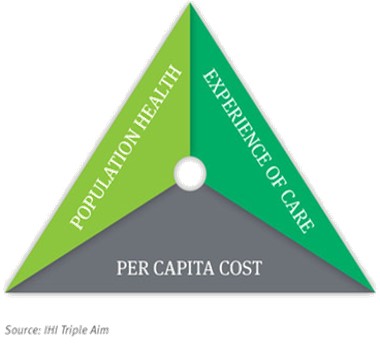Lisa Dulsky Watkins, MD, Onpoint's Clinical Advisor, Discusses Growing Trends in Healthcare
 Dr. Dulsky Watkins practiced general pediatrics for 12 years in Vermont, where she completed her internship and residency at the University of Vermont College of Medicine. She is one of the founding members of the Multi-State Collaborative at the Milbank Memorial Fund, and is now its Director. As the former Chief of Operations at the Vermont Blueprint for Health, where she served from 2008 to 2013, she acted as liaison to the state's health system community and director of the program's statewide implementation. Dr. Dulsky Watkins currently serves on a number of committees and advisory groups, including as a Cabinet Member of the Advocacy and Public Policy Center of the Patient-Centered Primary Care Collaborative.
Dr. Dulsky Watkins practiced general pediatrics for 12 years in Vermont, where she completed her internship and residency at the University of Vermont College of Medicine. She is one of the founding members of the Multi-State Collaborative at the Milbank Memorial Fund, and is now its Director. As the former Chief of Operations at the Vermont Blueprint for Health, where she served from 2008 to 2013, she acted as liaison to the state's health system community and director of the program's statewide implementation. Dr. Dulsky Watkins currently serves on a number of committees and advisory groups, including as a Cabinet Member of the Advocacy and Public Policy Center of the Patient-Centered Primary Care Collaborative.
Dr. Dulsky Watkins recently sat down with Onpoint’s Chad MacLeod to discuss a number of topics related to her experience in the healthcare industry, her activities with Onpoint, and her insights into the current healthcare system and reform agenda. Highlights from their conversation follow:
What are some key lessons learned from your work with Vermont’s Blueprint?
Dr. Dulsky Watkins noted that one fundamental lesson she learned from working with a statewide reform initiative like Blueprint is that it is "very important to be able to effectively collect information about the impact of healthcare reform initiatives." To achieve each of the Institute for Healthcare Improvement's Triple Aim dimensions — (1) improving the patient’s experience of care, (2) improving the health of populations, and (3) reducing the per-capita cost of healthcare — it’s crucial to get an accurate assessment of the current state of healthcare delivery. Generating this fundamental data set, which becomes the baseline for gauging the success of reform efforts, she emphasizes, requires "a trustworthy, effective, and consistent" evaluator that is able to clean, standardize, and analyze the data collected from these nationally and state-led programs.
What are some of the key activities played by a clinical advisor?
As Onpoint's Clinical Advisor, Dr. Dulsky Watkins offers valuable insight and direction in the development of analytic products and services that respond to the rapidly evolving reform efforts around the country. Reliable health data and analytics are foundational to healthcare programs as they seek to determine, for example, whether a patient's healthcare experiences change (for better or for worse) over time. This kind of data leverage - using seemingly isolated points to demonstrate a program's impact on reaching the Triple Aim - is exactly what Dr. Dulsky Watkins considers to be of tremendous interest to policymakers and providers, especially when that data is collected, analyzed, and distributed by a nonpartisan, independent organization.
Does the future direction of healthcare reform align with the Triple Aim?
 Today, many programs, like the Blueprint, are "integral pieces of the landscape of healthcare reform in the United States," observes Dr. Dulsky Watkins. She adds that a number of federally funded projects launched by the Innovation Center at the U.S. Centers for Medicare & Medicaid Services (CMS), including Accountable Care Organizations (ACOs), Comprehensive Primary Care (CPC) initiatives, Multi-Payer Advanced Primary Care Practice (MAPCP) demonstrations, and State Innovation Model (SIM) initiatives, will assist in driving transformative, sustainable changes in healthcare systems across local communities. However, the challenge yet to be resolved, Dr. Dulsky Watkins points out, is how policymakers, providers, patients, payers, and employers alike will work together to incorporate each of these programs into their existing infrastructures. This, she notes, will be the key to creating an integrated and functional healthcare system that effectively impacts each of the Triple Aim's components.
Today, many programs, like the Blueprint, are "integral pieces of the landscape of healthcare reform in the United States," observes Dr. Dulsky Watkins. She adds that a number of federally funded projects launched by the Innovation Center at the U.S. Centers for Medicare & Medicaid Services (CMS), including Accountable Care Organizations (ACOs), Comprehensive Primary Care (CPC) initiatives, Multi-Payer Advanced Primary Care Practice (MAPCP) demonstrations, and State Innovation Model (SIM) initiatives, will assist in driving transformative, sustainable changes in healthcare systems across local communities. However, the challenge yet to be resolved, Dr. Dulsky Watkins points out, is how policymakers, providers, patients, payers, and employers alike will work together to incorporate each of these programs into their existing infrastructures. This, she notes, will be the key to creating an integrated and functional healthcare system that effectively impacts each of the Triple Aim's components.
What are some opportunities in data management services for transforming the healthcare system?
There are absolutely clear central issues relating to data management in healthcare reform." What our system needs, Dr. Dulsky Watkins observes, is reliable and accessible information and the ability to receive, organize, and manage that information in an efficient and effective manner. For example, providers should not only regularly take more time to look over prepared analyses of their healthcare delivery and effectiveness, but, for their interests to be best served, they should also report the most precise data to the APCD to ensure that only dependable (and accurate) health data is used in developing the analyses they receive.
What are some opportunities in health analytics for transforming the healthcare system?
There is a major need for reliable and accessible information to be applied analytically to various facets of the healthcare industry, says Dr. Dulsky Watkins. The value of empowering policymakers or providers, for instance, to conveniently pull reports that compare practices or patient interventions is priceless — and the rewards of such development are endless. Overall, she notes, there is both a demand and a necessity for credible data to be generated through analytics to support a wide range of healthcare applications. In the end, though, it will take a combined effort between data management and analytic services to transform the healthcare system. But, as Dr. Dulsky Watkins reminds us, patience is a virtue.